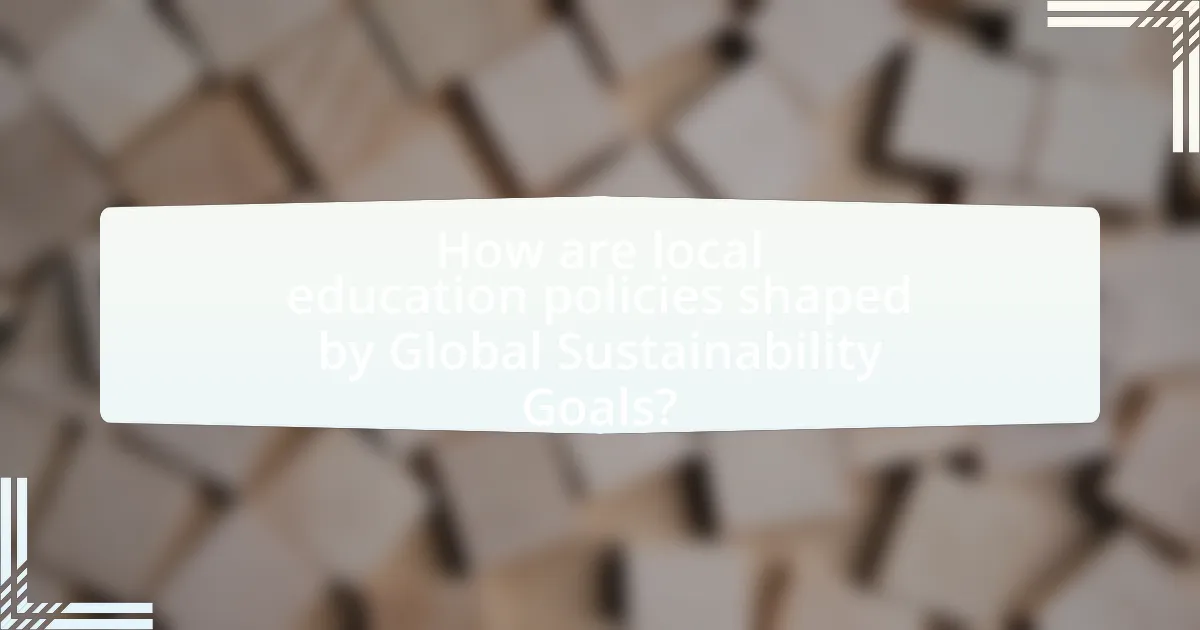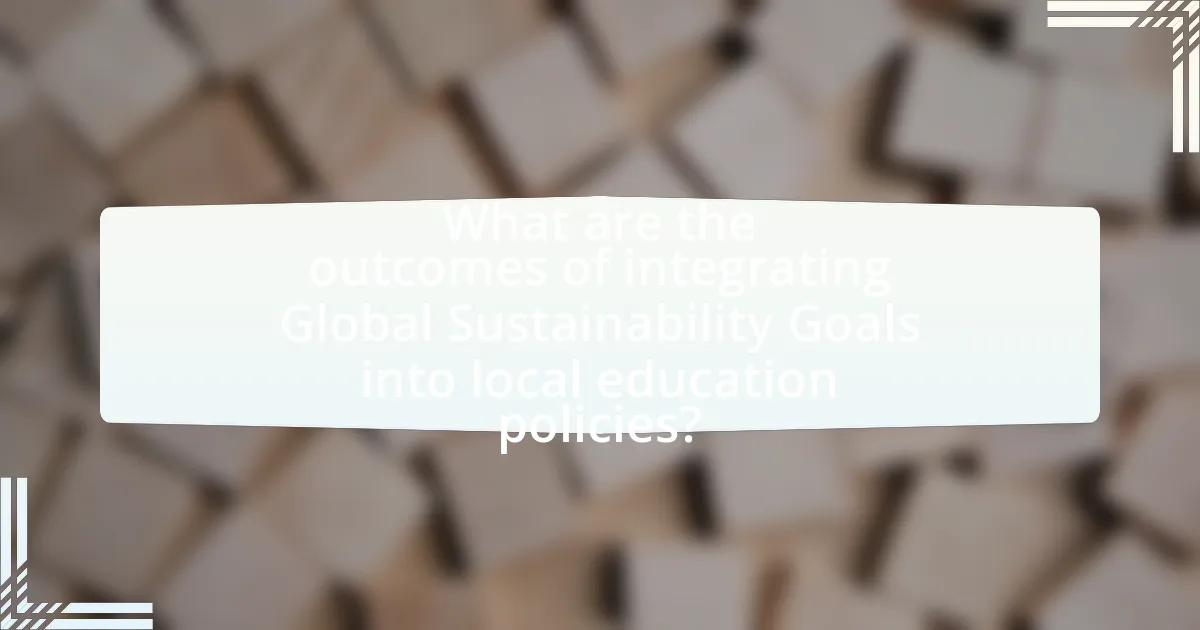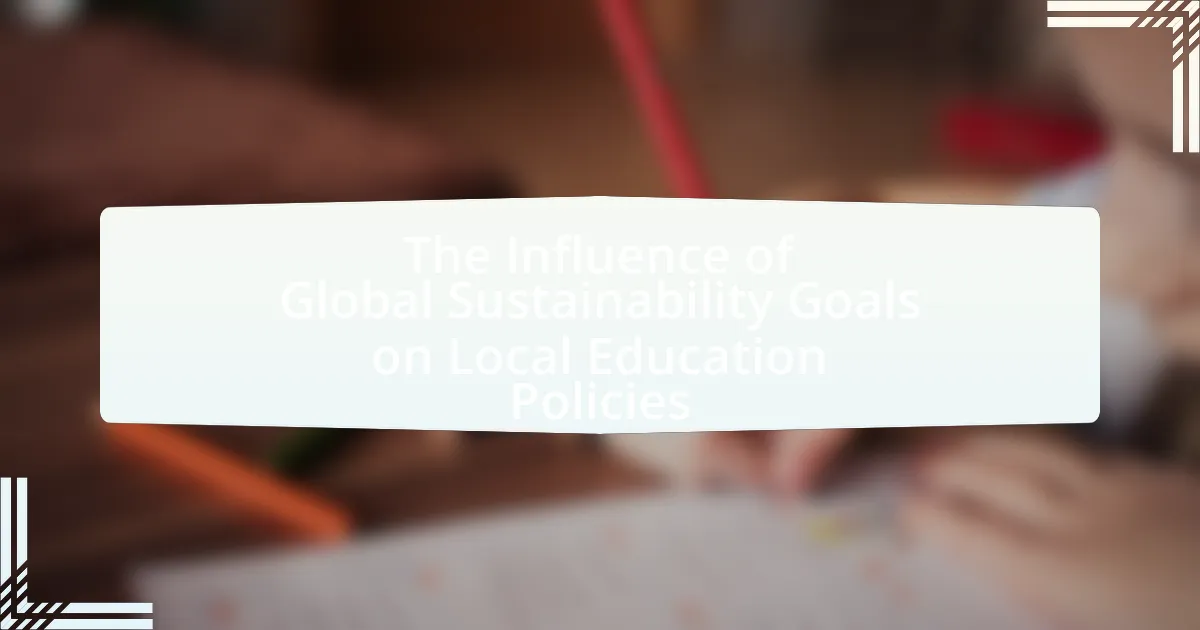Global Sustainability Goals, particularly the United Nations Sustainable Development Goals (SDGs), are a framework of 17 objectives aimed at addressing critical global issues such as poverty, inequality, and climate change. This article examines how these goals influence local education policies by promoting the integration of sustainability principles into curricula and educational practices. It highlights the significance of Goal 4, which focuses on inclusive and equitable quality education, and discusses the role of local governments in implementing these policies. Additionally, the article addresses challenges faced by education systems in adopting sustainability goals and the impact of socio-economic factors on educational equity. Through this exploration, the article underscores the importance of aligning local education strategies with global sustainability objectives to enhance student engagement and learning outcomes.

What are Global Sustainability Goals and their significance?
Global Sustainability Goals, specifically the United Nations Sustainable Development Goals (SDGs), are a set of 17 interconnected objectives aimed at addressing global challenges such as poverty, inequality, climate change, environmental degradation, peace, and justice. Their significance lies in providing a universal framework for countries to align their policies and initiatives towards sustainable development, fostering collaboration and accountability among nations. The SDGs, adopted in 2015, emphasize the need for inclusive education, gender equality, and sustainable economic growth, which directly influence local education policies by encouraging the integration of sustainability principles into curricula and educational practices. This alignment is crucial for equipping future generations with the knowledge and skills necessary to tackle these global challenges effectively.
How do Global Sustainability Goals influence education systems worldwide?
Global Sustainability Goals significantly influence education systems worldwide by integrating sustainability principles into curricula and educational policies. These goals, particularly the United Nations Sustainable Development Goals (SDGs), encourage countries to promote quality education that fosters critical thinking and awareness of sustainability issues. For instance, Goal 4 emphasizes inclusive and equitable quality education, which drives educational reforms aimed at addressing environmental challenges and social inequalities. Research shows that countries aligning their education systems with these goals report improved student engagement in sustainability initiatives, as seen in Finland’s education model, which incorporates environmental education across subjects. This alignment not only enhances educational outcomes but also prepares students to contribute to sustainable development in their communities.
What specific goals relate to education within the Global Sustainability framework?
The specific goals that relate to education within the Global Sustainability framework are primarily outlined in Sustainable Development Goal 4 (SDG 4), which aims to ensure inclusive and equitable quality education and promote lifelong learning opportunities for all. This goal emphasizes the importance of access to education, quality of education, and the need for relevant skills to foster sustainable development.
Additionally, SDG 4 includes targets such as ensuring that all youth and a substantial proportion of adults achieve literacy and numeracy, and that all learners acquire the knowledge and skills needed to promote sustainable development, including education for sustainable development and global citizenship. These targets are supported by various international agreements and frameworks, such as the Education 2030 Framework for Action, which reinforces the commitment to achieving quality education as a fundamental component of sustainable development.
How do these goals address educational inequalities?
The global sustainability goals address educational inequalities by promoting equitable access to quality education for all individuals, regardless of their socio-economic status. Specifically, Goal 4 of the Sustainable Development Goals (SDGs) emphasizes inclusive and equitable quality education and lifelong learning opportunities. This goal aims to eliminate disparities in education by ensuring that marginalized groups, including those from low-income backgrounds, girls, and individuals with disabilities, receive the necessary support and resources. Evidence from UNESCO indicates that achieving universal primary education could lift 171 million people out of extreme poverty, highlighting the direct impact of equitable education on reducing inequalities.
Why are local education policies important in the context of Global Sustainability Goals?
Local education policies are crucial for achieving Global Sustainability Goals because they directly shape the educational framework that promotes sustainable practices and awareness at the community level. These policies enable the integration of sustainability concepts into curricula, fostering critical thinking and problem-solving skills among students, which are essential for addressing global challenges. For instance, the United Nations Educational, Scientific and Cultural Organization (UNESCO) emphasizes that education is a key driver for sustainable development, highlighting that local policies can tailor educational content to reflect specific environmental and social issues relevant to the community. This localized approach ensures that education is not only relevant but also actionable, empowering individuals to contribute to sustainability efforts effectively.
What role do local governments play in implementing these policies?
Local governments play a crucial role in implementing policies aligned with global sustainability goals in education. They are responsible for adapting national and international sustainability frameworks to local contexts, ensuring that educational institutions incorporate sustainable practices. For instance, local governments often develop and enforce regulations that promote environmental education, resource conservation, and community engagement in schools. This localized approach is essential, as it allows for the integration of specific community needs and values into educational policies, thereby enhancing their effectiveness. Additionally, local governments frequently collaborate with educational stakeholders, such as teachers and parents, to foster a shared commitment to sustainability, which is vital for achieving long-term educational outcomes.
How can local education policies align with global sustainability objectives?
Local education policies can align with global sustainability objectives by integrating sustainability education into curricula, promoting environmental stewardship, and fostering community engagement. For instance, the United Nations Sustainable Development Goals (SDGs) emphasize quality education and sustainable practices, which local policies can adopt by incorporating these principles into teaching methods and school operations. Research indicates that schools implementing sustainability-focused programs see increased student awareness and engagement in environmental issues, demonstrating the effectiveness of such policies in achieving broader sustainability goals.

How are local education policies shaped by Global Sustainability Goals?
Local education policies are shaped by Global Sustainability Goals through the integration of sustainable development principles into curricula and educational frameworks. These goals, established by the United Nations, emphasize the importance of quality education, environmental sustainability, and social equity, prompting local governments to align their educational strategies with these global objectives. For instance, many local education authorities have adopted policies that promote environmental education and awareness, reflecting the Sustainable Development Goal 4, which aims to ensure inclusive and equitable quality education. This alignment is evidenced by initiatives such as the incorporation of sustainability topics into lesson plans and the establishment of partnerships with organizations focused on sustainability, demonstrating a direct influence of global goals on local educational practices.
What are the key components of local education policies influenced by these goals?
Key components of local education policies influenced by global sustainability goals include curriculum integration, stakeholder engagement, resource allocation, and assessment frameworks. Curriculum integration ensures that sustainability concepts are embedded in educational content, promoting awareness and understanding among students. Stakeholder engagement involves collaboration with community members, educators, and policymakers to align educational objectives with sustainability goals. Resource allocation focuses on providing necessary funding and materials to support sustainable practices in schools. Assessment frameworks evaluate the effectiveness of educational programs in achieving sustainability outcomes, ensuring accountability and continuous improvement. These components collectively enhance the relevance and impact of local education policies in addressing global sustainability challenges.
How do curriculum changes reflect Global Sustainability Goals?
Curriculum changes reflect Global Sustainability Goals by integrating sustainability principles into educational frameworks. These changes often include the incorporation of topics such as climate change, biodiversity, and sustainable development into various subjects, ensuring that students understand the importance of these issues. For instance, the United Nations Educational, Scientific and Cultural Organization (UNESCO) emphasizes education for sustainable development as a key component in achieving the Sustainable Development Goals (SDGs). This alignment encourages critical thinking and problem-solving skills related to sustainability, preparing students to contribute to a more sustainable future.
What funding mechanisms support the integration of sustainability in education?
Funding mechanisms that support the integration of sustainability in education include government grants, private sector investments, and international funding programs. Government grants, such as those from the U.S. Department of Education, provide financial resources specifically aimed at enhancing sustainability curricula and practices in schools. Private sector investments often come from corporations seeking to fulfill corporate social responsibility goals, which can include funding for educational initiatives focused on sustainability. Additionally, international funding programs, like those from the United Nations or the World Bank, allocate resources to support educational reforms that align with global sustainability goals, such as the Sustainable Development Goals (SDGs). These mechanisms collectively enable educational institutions to implement and sustain programs that promote environmental awareness and sustainable practices.
What challenges do local education systems face in adopting these goals?
Local education systems face significant challenges in adopting global sustainability goals, primarily due to limited funding and resources. Many local governments struggle to allocate sufficient financial support for implementing these goals, which can hinder the development of necessary infrastructure and educational programs. Additionally, there is often a lack of trained personnel who can effectively integrate sustainability concepts into the curriculum, leading to gaps in knowledge and teaching quality. Furthermore, resistance to change from stakeholders, including educators, parents, and policymakers, can impede the adoption process, as they may prioritize traditional educational methods over innovative approaches aligned with sustainability goals. These challenges are compounded by varying levels of commitment to sustainability across different regions, resulting in inconsistent implementation and effectiveness of educational policies.
How do socio-economic factors impact the implementation of sustainability in education?
Socio-economic factors significantly impact the implementation of sustainability in education by influencing resource allocation, access to quality education, and community engagement. For instance, schools in affluent areas often have better funding, allowing for the integration of sustainable practices such as green infrastructure and environmental curricula. In contrast, underfunded schools in low-income areas may lack the resources to implement such initiatives, leading to disparities in educational quality and sustainability efforts. Research indicates that socio-economic status correlates with educational outcomes; a study by the Organisation for Economic Co-operation and Development (OECD) found that students from lower socio-economic backgrounds are less likely to engage in sustainability education due to limited access to resources and opportunities. Thus, socio-economic factors create a framework that either facilitates or hinders the adoption of sustainability in educational settings.
What resistance might local education authorities encounter?
Local education authorities may encounter resistance from various stakeholders, including parents, teachers, and community members, who may oppose changes to curricula or policies aligned with global sustainability goals. This resistance often stems from concerns about the relevance of sustainability education, perceived loss of traditional educational values, or fear of increased workloads for educators. For instance, a survey by the National Education Association indicated that 60% of teachers felt unprepared to integrate sustainability into their teaching, highlighting a significant barrier to implementation. Additionally, local political dynamics can complicate the adoption of new policies, as elected officials may prioritize short-term interests over long-term sustainability initiatives.

What are the outcomes of integrating Global Sustainability Goals into local education policies?
Integrating Global Sustainability Goals into local education policies leads to enhanced environmental awareness and improved educational outcomes. This integration fosters a curriculum that emphasizes sustainability, encouraging students to engage with real-world challenges such as climate change and resource management. Research indicates that schools implementing sustainability-focused curricula report higher student engagement and academic performance, as seen in studies conducted by the United Nations Educational, Scientific and Cultural Organization (UNESCO), which highlight the positive correlation between sustainability education and student motivation. Additionally, local communities benefit from increased civic participation and a more informed citizenry, as students become advocates for sustainable practices within their communities.
How does this integration affect student engagement and learning outcomes?
The integration of global sustainability goals into local education policies significantly enhances student engagement and learning outcomes. This integration fosters a sense of relevance and purpose in students, as they connect their learning to real-world issues such as climate change and social equity. Research indicates that when students engage with sustainability topics, they demonstrate increased motivation and participation in their studies, leading to improved academic performance. For instance, a study by the National Environmental Education Foundation found that students involved in environmental education programs scored higher on standardized tests and exhibited greater critical thinking skills. Thus, the incorporation of sustainability goals not only captivates student interest but also positively influences their educational achievements.
What evidence exists to support the effectiveness of sustainability-focused education?
Sustainability-focused education has been shown to effectively enhance students’ environmental awareness and behavior. Research conducted by the University of Georgia found that students who participated in sustainability education programs demonstrated a 30% increase in pro-environmental behaviors compared to those who did not engage in such programs. Additionally, a study published in the Journal of Environmental Education indicated that integrating sustainability into the curriculum leads to improved critical thinking skills and a greater understanding of complex environmental issues. These findings underscore the positive impact of sustainability-focused education on both individual behavior and cognitive development.
How do students perceive the relevance of sustainability in their education?
Students perceive the relevance of sustainability in their education as increasingly significant, recognizing its importance for future societal and environmental challenges. Research indicates that a majority of students believe sustainability education equips them with essential skills and knowledge to address global issues, with studies showing that 70% of students support integrating sustainability into curricula. This perception is reinforced by the growing emphasis on sustainability in educational policies, aligning with global sustainability goals such as the United Nations Sustainable Development Goals, which advocate for quality education that promotes sustainable practices.
What best practices can local education systems adopt to enhance sustainability efforts?
Local education systems can enhance sustainability efforts by integrating sustainability into the curriculum, promoting energy efficiency in school facilities, and fostering community partnerships. Integrating sustainability into the curriculum ensures that students learn about environmental issues and sustainable practices, which can lead to more environmentally conscious behaviors. For instance, the United Nations Educational, Scientific and Cultural Organization (UNESCO) emphasizes education for sustainable development as a key component in achieving sustainability goals. Promoting energy efficiency in school facilities, such as using renewable energy sources and implementing waste reduction programs, can significantly reduce the carbon footprint of educational institutions. Additionally, fostering community partnerships with local organizations can provide resources and support for sustainability initiatives, creating a collaborative approach to environmental stewardship. These practices collectively contribute to a more sustainable educational environment and align with global sustainability goals.
How can collaboration between local and global entities improve educational policies?
Collaboration between local and global entities can significantly improve educational policies by integrating diverse perspectives and resources, leading to more comprehensive and effective strategies. For instance, local educational authorities can benefit from global best practices and innovative approaches to curriculum development, as seen in initiatives like UNESCO’s Education for Sustainable Development, which promotes sustainability in education worldwide. This collaboration allows for the sharing of successful case studies and research, such as the Global Education Monitoring Report, which highlights effective educational strategies across different contexts. By aligning local policies with global sustainability goals, educational systems can address local needs while contributing to broader international objectives, ultimately enhancing the quality and relevance of education.
What role does community involvement play in successful sustainability education initiatives?
Community involvement is crucial for the success of sustainability education initiatives as it fosters local engagement and ownership of sustainability practices. When communities actively participate in educational programs, they contribute valuable local knowledge and cultural context, which enhances the relevance and effectiveness of the initiatives. Research indicates that programs with strong community ties, such as the “Community-Based Environmental Education” model, show improved student outcomes and increased community awareness about sustainability issues. This model emphasizes collaboration between educators, local organizations, and residents, leading to a more integrated approach to sustainability education that aligns with global sustainability goals while addressing local needs.
What practical steps can educators take to align their teaching with Global Sustainability Goals?
Educators can align their teaching with Global Sustainability Goals by integrating sustainability concepts into the curriculum, promoting critical thinking about environmental issues, and fostering community engagement. For instance, educators can incorporate project-based learning that addresses local sustainability challenges, such as waste management or energy conservation, which directly relates to the Sustainable Development Goals (SDGs) like Goal 11 (Sustainable Cities and Communities). Research shows that experiential learning increases student engagement and understanding of sustainability issues, as evidenced by studies from the Journal of Environmental Education, which highlight improved student outcomes when sustainability is woven into educational practices. Additionally, educators can collaborate with local organizations to provide students with real-world experiences that reinforce the importance of sustainability, thereby creating a direct link between education and community action.

Leave a Reply